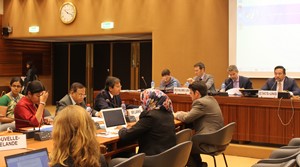
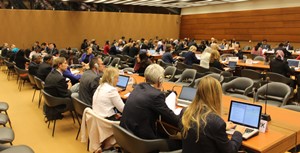
Sri Lanka’s Permanent Representative to the UN, Ambassador Ravinatha Aryasinha today outlined Sri Lanka’s view on the current draft resolution being considered at the 30th Session of the Human Rights Council during the first informal held at the Palais des Nations.
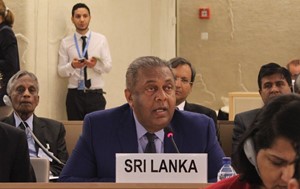
Minister of Foreign Affairs, Mangala Samaraweera addressed the 30th Session of the UN Human Rights Council, in his capacity as the leader of the Sri Lanka delegation today (14th September 2015) in Geneva.
Hon. Wijeyadasa Rajapakshe, Minister of Justice and Buddha Sasana, Hon. Austin Fernando, Governor - Eastern Province and Adviser to H.E. the President, Ambassador Ravinatha Aryasinha, Permanent Representative of Sri Lanka to the UN in Geneva and senior officials of the Government of Sri Lanka participated in the opening meeting.
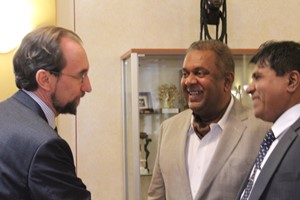
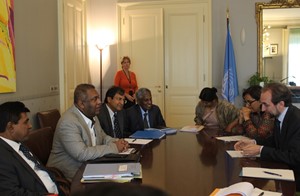
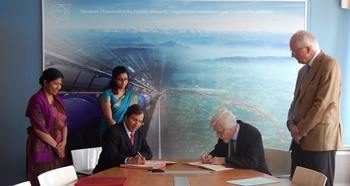
Sri Lanka and the European Organization for Nuclear Research (CERN) have entered into an agreement to begin cooperation between CERN and the scientific community in Sri Lanka. Sri Lanka‘s Permanent Representative to the UN in Geneva Ambassador Ravinatha Aryasinha and the Director General of CERN, Mr. Rolf-Dieter Heurer, signed an “Expression of Interest’ (EOI) Agreement on Thursday, 25 June 2015 at the CERN Headquarters in Geneva to give effect to this process.
CERN is the most prominent particle physics research institute in the world and is best known for its flagship discovery of the ‘Higgs-Boson” in 2012, conferring the 2013 Nobel Prize for Physics to two theoretical physicists who had predicted this fundamental particle almost 50 years earlier. More than half of the world’s particle physicists - about 11,000 in number coming from over 600 universities in 80 countries - do research at CERN, and are engaged in complex scientific experiments.
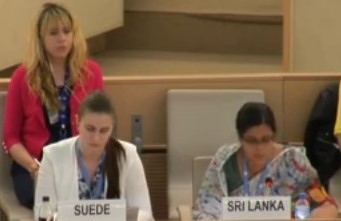
Sri Lanka has highlighted the importance of enhancing public investment in education as an essential prerequisite to ensure right to education. It was noted that the new Government has pledged to increase the total provision for education from 1.7 percent to 6 percent of the GDP as well as to increase Mahapola scholarships to Rs.5000.
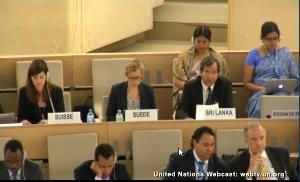
"Sri Lanka in order to prevent all forms of irregular migration, trafficking in persons and smuggling of human beings, is taking action against those traffickers under due processes, while treating the migrants as victims of smugglers". On the issue of migrants in Sri Lanka, "Sri Lanka is aware of the importance of looking at the issues related to irregular migrants into Sri Lanka in a nuanced manner and the need to develop a coherent national policy, as well as the additional capacity and resources required as a developing country, to handle matters related to migrant welfare".
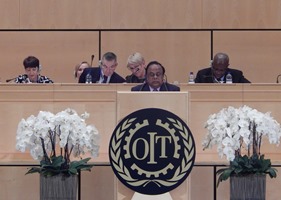
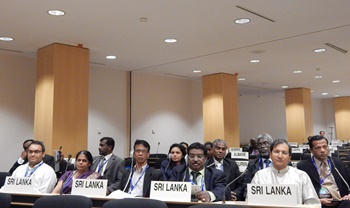
Minister of Labour S.B. Navinne addressed the 104th Session of the International Labour Conference in Geneva on 05 June 2015 and highlighted the importance of formulating policies and strategies to achieve decent work for all employees to ensure social justice. In this regard, Minister Navinne stated that Sri Lanka has taken steps to establish a “National Minimum Wage” for all private sector workers.
Minister Navinne appreciated the assistance extended by ILO to Sri Lanka in number of areas including the formulation of National Human Resources and Employment Policy, National Road Map of Youth Employment, HIV & AIDS policy for the world of work, the National Strategy on Territory, Vocational Education & Provision for Vulnerable People in Sri Lanka, implementation of Labour Inspection System Application, and the elimination of the Worst Forms of Child Labour through the implementation of Child Labour Free Zones.
- Minister Senaratne engages in series of Meetings on the sidelines of the World Health Assembly
- Sri Lanka takes a lead in Multi-lingual Internet Initiatives
- "Pictorial warning is the most cost effective means of controlling tobacco related NCDs, including cancer “- WHO DG tells event hosted by Sri Lanka in Geneva
